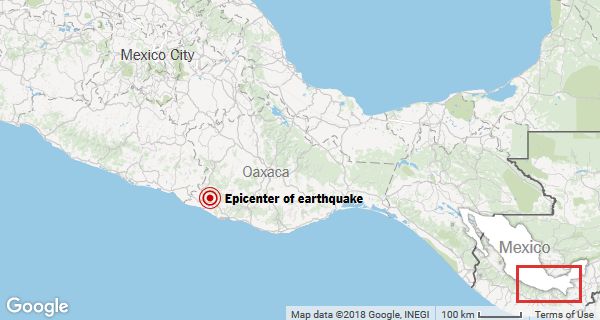Mexico City - A 7.2-magnitude earthquake struck Mexico's southern Pacific Coast on Friday, according to the United States Geological Survey. The quake was reported at 5:39 pm local time, shaking buildings about 225 miles away in Mexico City, where tremors left tall buildings swaying for more than two minutes.
No deaths or injuries were immediately reported. But 13 people were killed and 16 were injured hours later when a military helicopter transporting Mexico Interior Minister Alfonso Navarrete Prida and Oaxaca Governor Alejandro Murat to Pinotepa Nacional, a town near the quake's epicenter, crashed.
Mr. Navarrete later told Mexican news media that the pilot lost control while trying to land and the helicopter tipped over. The victims were in a temporary camp set up in a field in Colonia Aviación, where they had taken refuge after the 7.2 quake struck. Aftershocks had caused them to flee their homes for fear they would collapse.
Among the 13 fatalities were a four-month-old baby, two little girls around the age of nine, five women and four men. Twelve of them died at the crash site and one in the hospital. Mr. Navarrete and the governor, Alejandro Murat, were among the 15 people who sustained minor injuries.
The Oaxaca state director of civil protection, Heliodoro Díaz Escárraga, said that homes were damaged in the town of Santa María Chimalapas and that the town of Jamiltepec was one of the hardest hit. According to El Universal newspaper, more than 50 homes and hospitals in communities in the state's coastal region were damaged by the quake.
The epicenter of Friday's earthquake was between those of the 8.1 magnitude quake that struck September 7 off the southern Pacific coast near Chiapas state and the 7.1 temblor that hit closer to the capital on Sept. 19. But from a geological standpoint, all three occurred in the same general area - a so-called subduction zone, where one piece of the earth's crust, the Cocos Plate, is slowly sliding under another, the North American.
In addition to local destruction, strong Mexican earthquakes often cause damage in Mexico City - even if, as in this case, the capital is miles away. Mexico City was built on an ancient lake bed, and the sediments of sand and clay amplify the seismic waves as they arrive from the epicenter.
Sources: El Universal • New York Times


